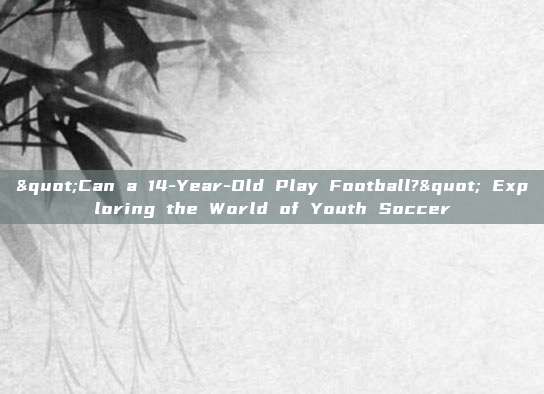 原标题:"Can a 14-Year-Old Play Football?" Exploring the World of Youth Soccer
原标题:"Can a 14-Year-Old Play Football?" Exploring the World of Youth Soccer
导读:
探索了14岁青少年参与足球运动的世界,展示了年轻运动员在竞技体育中追求职业梦想的同时,如何平衡学业与训练,应对身心压力。通过介绍青年发展计划、国际曝光机会以及学校和俱乐部的支持...
### "Can a 14-Year-Old Play Football?" Exploring the World of Youth Soccer


#### Introduction: The Early Years of Soccer Stardom
The question, "Can a 14-year-old play football?" is not as straightforward as it might seem. It delves into the heart of youth soccer, where dreams are nurtured and challenges faced. This article explores the world of young athletes who are on the cusp of their teenage years, navigating the complex landscape of competitive sports, balancing schoolwork with rigorous training sessions, and dealing with the physical and emotional pressures that come with pursuing a professional career in soccer.
#### The Journey Begins: A World of Opportunity
At 14, many young players have already been part of organized soccer for several years. They've attended countless practices, played in numerous tournaments, and perhaps even caught the eye of scouts. For these budding stars, the sport offers more than just a hobby—it's a pathway to a potential career.
**Youth Development Programs**: Across various countries, soccer academies and clubs provide structured programs designed to hone skills and instill discipline from an early age. These programs often include technical training, tactical understanding, and physical conditioning tailored to the specific needs of young athletes.
**International Exposure**: Some talented youngsters get opportunities to showcase their skills on the global stage through international tournaments and exchange programs. These experiences not only expose them to different playing styles but also foster a sense of camaraderie and cultural understanding.
#### Balancing Act: School and Soccer
For most 14-year-olds, balancing school responsibilities with the demands of competitive soccer can be challenging. Many clubs recognize this and work closely with schools to ensure that academic performance doesn't suffer.
**Flexible Schedules**: Some schools offer flexible schedules or online learning options to accommodate the training and travel requirements of young athletes. This allows them to focus on both their education and their passion for soccer.
**Support Systems**: Parents, coaches, and teachers play crucial roles in supporting these young players. They help manage expectations, provide emotional support, and ensure that the players remain grounded despite the pressure and excitement surrounding their budding careers.
#### The Physical and Emotional Toll
While the rewards of youth soccer can be immense, the journey is not without its challenges. Young athletes face physical and emotional hurdles that test their resilience and dedication.

**Injuries and Recovery**: Injuries are an inevitable part of any sport, and soccer is no exception. Clubs invest in medical staff and facilities to ensure that players receive the best care possible. However, the psychological impact of being sidelined cannot be underestimated.
**Mental Health**: The pressure to perform at a high level, combined with the fear of failure, can take a toll on young minds. Clubs are increasingly aware of the importance of mental health and provide resources such as counseling services and workshops to help players cope with stress and anxiety.
#### The Role of Parents
Parents play a critical role in the development of young soccer players. Their support and guidance can make all the difference in shaping a child's future in the sport.
**Encouragement vs. Pressure**: Finding the right balance between encouragement and pressure is key. While parents want their children to succeed, too much pressure can lead to burnout. Encouraging a love for the game rather than focusing solely on results helps create a positive environment.
**Financial Commitment**: Participating in elite soccer programs can be expensive. Travel costs, equipment, and fees can add up quickly. Many families make significant sacrifices to support their children's dreams, highlighting the depth of commitment required.
#### The Path Forward: Professional Dreams
For those who excel, the path to professional soccer is filled with hope and anticipation. At 14, some players are already being scouted by top clubs, which can lead to lucrative contracts and international fame.
**Scouting and Recruitment**: Scouts attend tournaments and games to identify talent. They look for players who not only possess exceptional skills but also display the right attitude and potential for growth. Clubs then offer trials and sometimes scholarships to promising youngsters.
**Life After Soccer**: While the dream of becoming a professional soccer player is a powerful motivator, not everyone makes it to the top. Clubs and organizations are increasingly focused on preparing players for life after soccer, offering educational and vocational guidance to ensure they have a solid foundation for their future.
#### Conclusion: Embracing the Challenge
The question of whether a 14-year-old can play football goes beyond the physical ability to kick a ball. It encompasses the entire ecosystem of youth soccer—training, education, support systems, and personal development. For those who choose this path, the journey is filled with challenges and rewards, shaping not just their futures in the sport but also their lives as individuals.
In a world where dreams are pursued with unwavering determination, the story of a 14-year-old playing football is a testament to the power of passion, perseverance, and the enduring spirit of the game.
 原标题:"Can a 14-Year-Old Play Football?" Exploring the World of Youth Soccer
原标题:"Can a 14-Year-Old Play Football?" Exploring the World of Youth Soccer







还没有评论,来说两句吧...